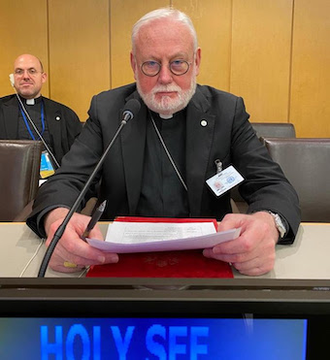Archbishop Gallagher speaks at UN on peace in Holy Land

On Monday, 18 September, Archbishop Paul Richard Gallagher, Secretary for Relations with States and International Organizations of the Holy See, addressed a meeting on the sidelines of the 78th Session of the UN General Assembly, entitled 'Peace Day Effort: An Effort for Middle East Peace"' The event was co-sponsored by the Kingdom of Saudi Arabia, the League of Arab States, the European Union, the Arab Republic of Egypt and the Hashemite Kingdom of Jordan.
In his remarks, Archbishop Gallagher stressed that the Holy See welcomes every peace initiative, as long as it is not detrimental to local populations or to the legitimate demands of both Israelis and Palestinians. He observed that the Palestinians currently find themselves in a very weak position due to "problems of internal governance" and due to the State of Israel's "increasingly heavy-handed and military invasive attitude".
Gallagher placed particular emphasis on the status and administration of Jerusalem, explaining that the Holy See views the Holy City "not as a place of confrontation and division, but as one of encounter". In this regard, Gallagher reiterated the Holy See's support for an internationally guaranteed "special statute" for Jerusalem, which would preserve and promote the city's specific multi-religious character, spiritual dimension and unique identity and cultural heritage".
Read the full statement below:
Remarks of HE Archbishop Paul Richard Gallagher, Secretary for Relations with States and International Organizations of the Holy See, at the Closed Ministerial-Level Meeting: 'Peace Day Effort: An Effort for Middle East Peace'.
18 September 2023
Excellencies,
Ladies and Gentlemen,
The Holy See has always followed with particular attention the situation in the territories where the State of Israel and the State of Palestine are present today. The Holy See's interests in that region are focused essentially on two aspects: the existence of the Holy Places of the Lord Jesus, entrusted by the Popes to the Custody of the Friars Minor more than 800 years ago; and above all the uninterrupted and constant presence of the Christian community for 2000 years.
The Holy See is firmly convinced that peace between Israelis and Palestinians, and in the region more generally, would benefit the entire international community. That is why every peace initiative is welcome, including the Arab Peace Initiative, as long as it is not to the detriment of local populations, or to the legitimate demands of both Israeli and Palestinians. The latter - we must honestly acknowledge - are today in a very weak position, both because of problems of internal governance and because of the increasingly heavy-handed and militarily invasive attitude of the State of Israel.
It is indeed sad to note that we are still here discussing the Israeli-Palestinian conflict 30 years after the signing of the Oslo Accords on 13 September 1993, which gave a glimpse of what the two-state solution for the two peoples would look like. In that atmosphere, the Holy See found fertile grounds to take some very important steps, namely the establishment of diplomatic relations with the State of Israel (1993), with the Kingdom of Jordan (1994) and a new dialogue with the Palestine Liberation Organisation, which then culminated in the full recognition of the State of Palestine (2012).
A central point of contention that needs to be addressed in order to achieve a stable and lasting peace is the administration of the City of Jerusalem. It is clear that this City is very important for us Christians, as well as for Jews and Muslims, who all see it as the Holy City. It is precisely for this reason that the Holy See sees Jerusalem, not as a place of confrontation and division, but as one of encounter where Christians, Jews and Muslims can live together with respect and mutual goodwill. It is truly sad to see acts of intolerance in Jerusalem, such as those recently perpetrated by some Jewish extremists against Christians. Any such actions must be clearly condemned by all governments, first and foremost the Israeli Government, as well as prosecuted by the law and prevented in the future through education in fraternity.
In the working groups that you intend to launch today, of which the Holy See takes note with interest, I ask you to include a reflection on the City of Jerusalem by thinking of it as a City of encounter, that is, a place preserved by an internationally guaranteed "special statute".
The Holy See has been promoting the idea of a special statute for years, because it is firmly convinced that whoever administers the City of Jerusalem should adhere to internationally guaranteed principles, such as: the equal rights and duties of the faithful of the three monotheistic religions (Christians, Jews and Muslims), the absolute guarantee of freedom of religion and of access to and worship in the Holy Places, and respect for the Status Quo regime, where it applies. To this end, the specific multi-religious character, spiritual dimension and the unique identity and cultural heritage of Jerusalem must be preserved and promoted.
Pope Francis has repeatedly called on Israelis and Palestinians to engage in direct dialogue, addressing each of those issues that have grown more complicated over the years, even those that appear to lack a clear solution. Almost 10 years ago, on 8 June 2014, then Israeli President Shimon Peres and Palestinian President Mahmoud Abbas met in the Vatican to pray together for peace and - together with the Pope Francis - planted an olive tree in the Vatican gardens. After that meeting, it seems to me that there have not been any more similar high-level meetings. Nevertheless, we continue to water that olive tree, waiting for the Presidents of both States, accompanied by their Governments, to come again to reap the fruits of peace.
Thank you.


















